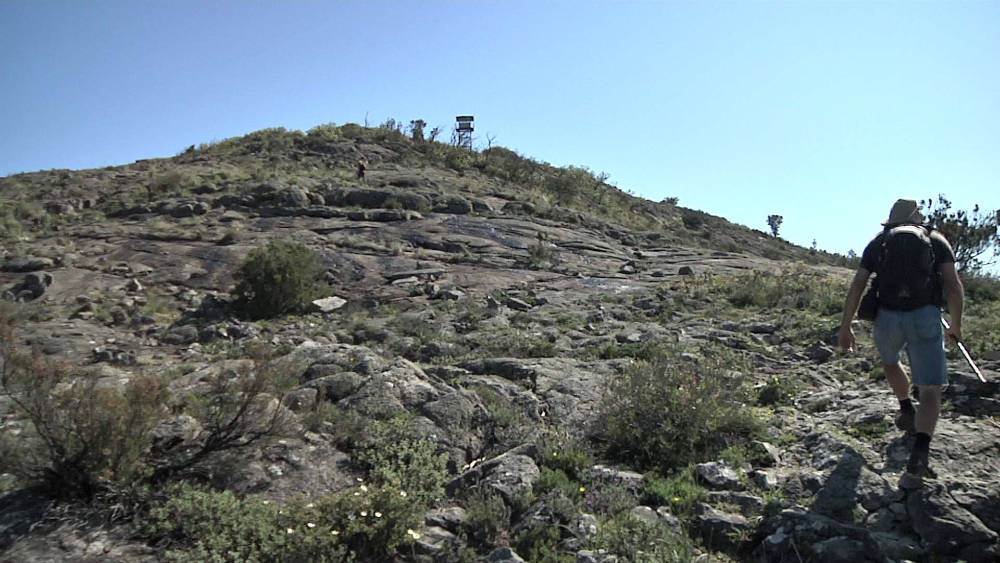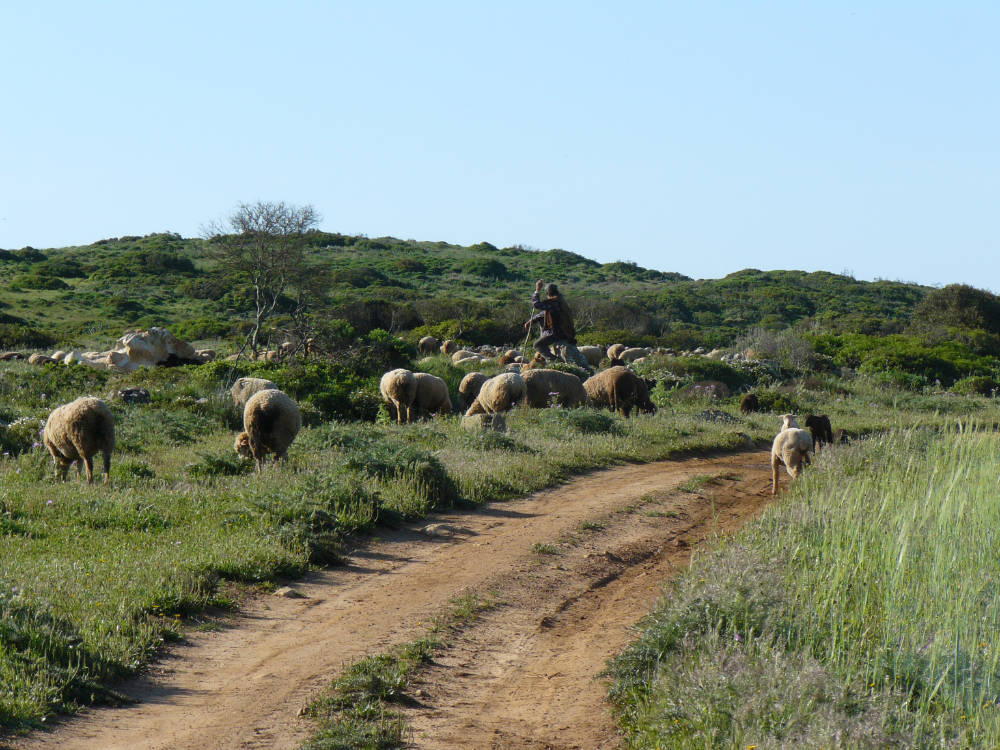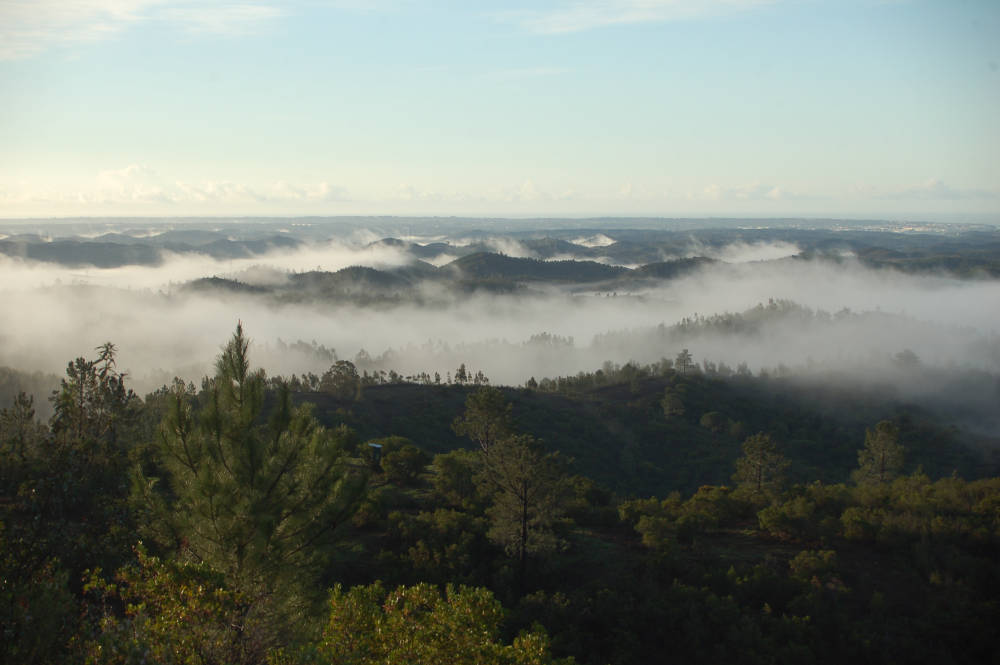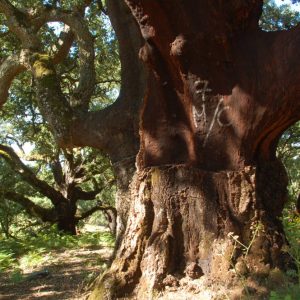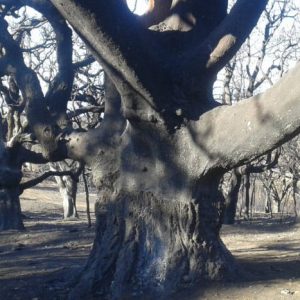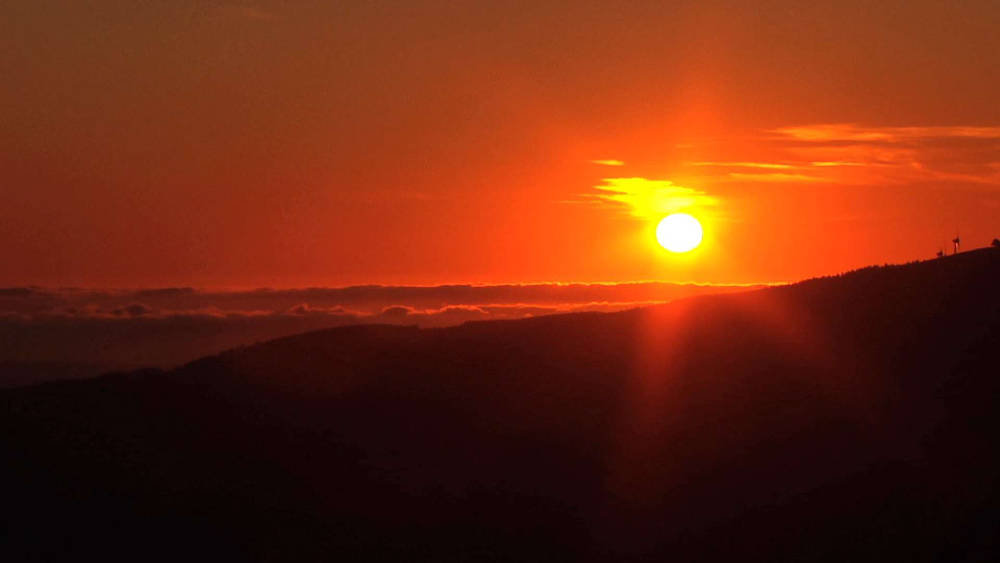Saturday the 20th may of 2023.
Part One.
On 5 November Lenz was walking through the hills, all by himself. The summits and high mountain flanks were gleaming in the sun, and the valleys below were covered in green after the rain. Brooks were rushing across the rocks, and the eucalyptus trees were swaying in the wind. Temperatures had gone up a bit again. The clouds in the sky were scurrying from north to south, as if in a hurry. The umbrella pines above him were absorbing the strong winds. The air was humid and the long valleys stretching from the summit of Picota down to the plains of the Vale do Boi had water, something that hadn’t happened for the longest time. The river beds of the region had dried out nearly a year ago, and the little water left here and there in a few places smelt off and was retained in toxic green puddles. The rain had come from the sea, from the southwest. At last. The wind had pushed the clouds, fit to burst, against the mountains. Once enough clouds had collected, it rained long and hard. Thanks be to God.
So what would happen in Lisbon if UFOs landed right on the Avenida da Liberdade and Aliens started gobbling up humans? Pushing this crazy notion to one side, Lenz had put together his backpack the evening before. Slices of buttered bread, fruit, water, a small medical kit for emergencies. Early in the morning he started out from Caldas. He was a man on a mission. It was not yet light. His plan was to take the high road via Esgravatadouro to Fornalha. There was this story of the invaders going round. That’s what he wanted to investigate. Vapour was hovering above the valleys called barranco here, and the moisture created the first shreds of cloud. Walking through this was like walking through fog. Then the sun appeared, all of a sudden, very quickly. With the sun rising from the sea he carried on, uncaring. He wasn’t interested in the path as such, rising and falling, rising and falling. He was investigating the vegetation. The once varied forest lay destroyed. One single species of tree was on the march to destroy biodiversity. And everyone was looking on, not caring, as if they hadn’t seen the approaching danger.
He spotted Zé Eduardo, the shepherd with his goats across the way. He was missing Senhor Florival, the lone and last forester, father to Zé Eduardo. Senhor Florival had passed away last winter. Lenz didn’t feel any tiredness, but sometimes he regretted that he couldn’t walk on his head. Years ago there had been forest fires here. Now, wild brush had taken over. Eucalyptus and acacias were fighting for supremacy. Which tree species would gain the upper hand? In truth, the issue was a completely different one. Nobody seemed to sense the danger. Charred cork oaks were lying by the trailside. Over here a burnt-out pine tree. Over there the ruins of a building appeared, with no roof. Everything completely empty. Nature was out of kilter. Through the windows he was able to see the sky. Two hours later he reached Fornalha where he took a turn and started hiking up a steep hill. Green pastures and some more ruins. No human being lived here anymore.
Initially he felt his chest constrict, sensing his firm pace on the tarmac, the fog hiding the shapes of things along his path only to reveal them again shortly after. He was driven, he was looking for something, like lost dreams, but couldn’t find anything. Everything appeared so small to him, so close, so wet, that he wanted to place the earth behind the oven; he didn’t understand why he needed so much time to climb an incline, for now it became a steep task to reach a faraway spot; he felt that he should be able to pace it all out with a few steps. Only occasionally, when the storm threw the clouds from the summit down into the valleys, making the vapours rise up the forest, and the voices around the rocks woke up, sometimes like thunder trailing off far away, then again storming in forcefully, making sounds as if they wanted to sing the earth in their wild ecstasy, and the clouds were erupting like wild neighing steeds, with the sunshine appearing in the gaps, and his staff was touching the earth. Was all this real?
He stood, taking a break, panting, his body bent forwards, eyes and mouth wide open; he reckoned he had to pull the storm inside himself, bring everything inside of him, he felt himself expanding and spreading across the earth, burrowing into the universe, it was a painful pleasure. Then again he stood still, laying his head down onto the moss, half closing his eyes. The earth shifted away from him, becoming small like a wandering star and diving into a raging stream with clear waters beneath. But these were only moments, then he rose, sober, firm, tranquil as if a shadow play had passed in front of him. He had forgotten everything that had gone before. It was thus that he reached Corte Grande, and visited the place where the tree had stood, a large old tree needing eleven men to embrace it. The path leading through the small cork oak forest calmed him down again, turning him mellow and allowed him to believe once again that the world was not yet lost. He started humming a song and took a short rest, eating one of his buttered slices of bread, and heard the song of a nightingale that had got the season wrong.
When the fire came the tree had simply been forgotten as the inhabitants ran for cover. The firefighters were busy in other places and the fire was allowed to rage. This tree had stood there and seen them all, the Romans, the Moors, the Spanish, and all that passed by or lived here. A tree can’t run away. It had survived the 2003 forest fire. Some specialists had estimated it to be 2,000 years old. Now it was a mere burnt-down stump, standing there as if ready for its own funeral, in black. It had simply been forgotten. Those thoughts no longer left him.
Around midday Lenz reached the heights of the mountain range where all of a sudden you could contemplate the whole world from above. Rocks were waiting to be climbed, and then all of a sudden it was done. He was standing on top of Picota and saw the sea to the south and the sea to the west, and the land to the north and east. This was Europe. This is where the Old World ended. Over there was Mama Africa. This is where Europe began.
He was squinting to make out the trail. The descent started in the plain towards the west. He sat down for a bit up here. By now his soul had calmed down; the clouds were lying firm and unmoving in the sky, as far as the eye could see, nothing but sky, from which broad flanks reached down, and everything so quiet, blue and white, dawning. He felt awfully lonesome, he was alone, completely alone. He wanted to speak with himself but he hardly dared to breathe; the bending of his foot sounded like thunder beneath him, he had to sit down. He was in the grip of a nameless fear in this complete nothingness, this emptiness around him; he raised himself up and flew down the slope. It was afternoon by now, sky and earth melting into one. He felt as if something was after him, as if something terrifying was about the reach him, something that humans could not bear, as if madness was chasing him on horseback. It was the acacias. The smell was pursuing him. All of a sudden they were everywhere.
At last he heard real voices, saw lights, he felt his heart lift; he was told he had another half hour to go down to Monchique. He entered the village, the first houses giving him guidance, with the lights shining through the windows that he looked into passing by, seeing children at table, old ladies, girls, all of them tranquil quiet faces, he felt as if the light was emanating from within them. He felt his spirits lift once he reached the Pé da Cruz to wait for the local bus that would take him back to Caldas and his accommodation. His first day in nature was nearing its end. It was getting dark…
 Eco123 Revista da Economia e Ecologia
Eco123 Revista da Economia e Ecologia

